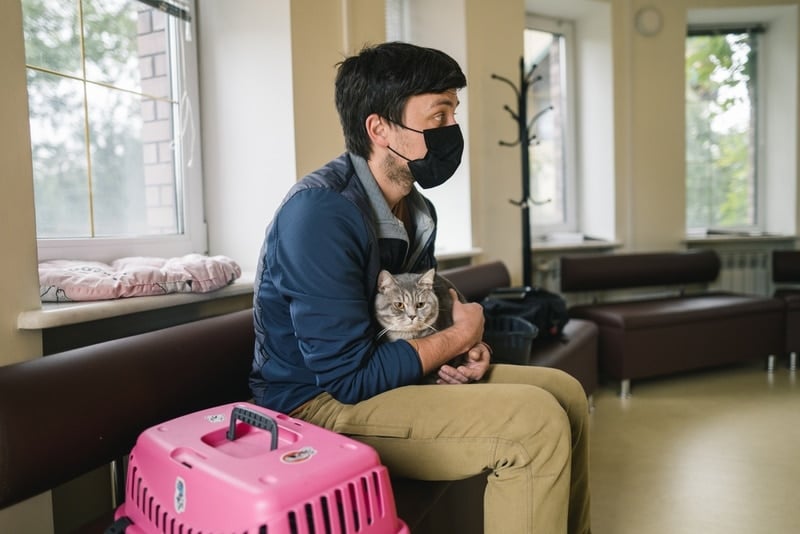Also called the Big Easy or Nola, New Orleans is a quintessential southern melting pot of vibrant nightlife, jazz music, Cajun food, rich French and Spanish colonial history, and of course, the annual Mardi Gras celebration where everyone gets a bead necklace and unbridled party fever rules the famed Bourbon Street.
Whether you’re in town to party, attend a wedding, sightsee historical hotspots, or check out the to-die-for Louisianian cuisine, you’ll need dog and cat-friendly hotels that know your pet is down to party too. Let’s dive into some of the best lodgings you can book today in the Big Easy that know your pet is an essential member of your Mardi Gras entourage.
The 6 Pet-Friendly Hotels Near New Orleans
1. Virgin Hotels New Orleans

View Deals at Virgin Hotels New Orleans
| 🗺️ Address: | 📍 550 Baronne St, New Orleans, LA 70113 |
| ⭐ Star Rating: | ⭐⭐⭐⭐ |
| 🕐 Open Times: | 24/7 front desk |
| 💲 Cost: | Free—no deposits, fees, or additional pet-related charges |
| 🐕 Off-Leash Area: | No |
- Pet bed included
- Situated in the Warehouse District
- Near comedy, jazz, and poolside social clubs.
2. Magnolia Hotel New Orleans

View Deals at Virgin Hotels New Orleans
| 🗺️ Address: | 📍 535 Gravier St, New Orleans, LA 70130 |
| ⭐ Star Rating: | ⭐⭐⭐⭐ |
| 🕐 Open Times: | 24/7 front desk |
| 💲 Cost: | $100 non-refundable pet fee per stay (max of 2 pets) |
| 🐕 Off-Leash Area: | No |
- Work areas, coffeemaker, sitting area, optional rollaway beds, and a view of the historic Central Business District
- On-site gym and continental breakfast
- Just 10-minutes walking distance from Bourbon Street and even closer to the French Quarter
3. Kimpton Hotel Fontenot

View Deals at Kimpton Hotel Fontenot
| 🗺️ Address: | 📍 501 Tchoupitoulas St, New Orleans, LA 70130 |
| ⭐ Star Rating: | ⭐⭐⭐⭐⭐ |
| 🕐 Open Times: | 24/7 front desk |
| 💲 Cost: | Free—no deposits, fees, or additional pet-related charges |
| 🐕 Off-Leash Area: | No |
- 5-star lodgings
- Within blocks of the French Quarter
- Visit the Peacock Room, a lavish fusion of a classic French salon and a modern 5-star hotel bar
4. Creole Gardens Guesthouse

View Deals at Creole Gardens Guesthouse
| 🗺️ Address: | 📍 1415 Prytania St, New Orleans, LA 70130 |
| ⭐ Star Rating: | ⭐⭐⭐⭐⭐ |
| 🕐 Open Times: | 7:30 am to 9:00 pm |
| 💲 Cost: | $15 non-refundable fee for 1 pet per stay, $15 each for additional pets |
| 🐕 Off-Leash Area: | No |
- Charming Southern antebellum bed and breakfast
- Unbeatable location
- Includes a dog-friendly event space open every Friday night for guests
5. The Old No. 77 Hotel & Chandlery

View Deals at The Old No. 77 Hotel
| 🗺️ Address: | 📍 535 Tchoupitoulas St, New Orleans, LA 70130 |
| ⭐ Star Rating: | ⭐⭐⭐⭐ |
| 🕐 Open Times: | 24/7 front desk |
| 💲 Cost: | $75 nonrefundable fee per animal, up to 2 pets per room |
| 🐕 Off-Leash Area: | No |
- Rooms feature art by students from the New Orleans Center for Creative Arts
- On-site eatery
- Rent a bike and explore the city
6. St. Charles Inn

View Deals at St. Charles Inn Hotel
| 🗺️ Address: | 📍 3636 St Charles Ave, New Orleans, LA 70115 |
| ⭐ Star Rating: | ⭐⭐⭐⭐ |
| 🕐 Open Times: | 24/7 front desk |
| 💲 Cost: | $25 fee per night per pet (max of 2 pets) |
| 🐕 Off-Leash Area: | No |
- Located in the tranquil Garden District
- Proximity to the Superdome, Audubon Zoo, the Aquarium of the Americas
- On-site library
- Communal lounge area and daily hot continental breakfast

Conclusion
New Orleans is the home of jazz music and Creole food, and millions flock there every year to marvel at Mardi Gras and wade into all the irresistible cultural fusion the city has to offer. When you’re traveling with your pet to the Big Easy, make sure to jot down the hotels listed here and make a comprehensive travel plan before booking your trip.
Featured Image Credit: Frau aus UA, Shutterstock








